-
 Art of Wellness Acupuncture & Traditional Chinese Medicine (TCM)11704 Wilshire Blvd, Suite 295, Los Angeles, CA, 90025
Art of Wellness Acupuncture & Traditional Chinese Medicine (TCM)11704 Wilshire Blvd, Suite 295, Los Angeles, CA, 90025
myartofwellness@gmail.com310-451-5522 Office Hours
MonClosedTue7:30 am --4 pmWed7:30 am --4 pmThu7:30 am -- 4 pmFri7:30 am -- 4 pmSat7:30 am -- 4 pmSunClosedOur office opens from Tuesdays to Saturdays 7:30 am to 4 pm, will be closed on Memorial day, Independent day, Labor day, Thanksgiving day, Christmas and New year.
-
Recent Posts
- How to Treat Metabolic Syndrome With Acupuncture and TCM
- How to Treat Syncope With Acupuncture and TCM
- How to Treat Thoracic Outlet Syndrome With Acupuncture and TCM
- How to Treat Dupuytren’s Contracture With Acupuncture and TCM
- How to Treat Nutcracker Syndrome With Acupuncture and TCM
- How to Treat Rosacea With Acupuncture and TCM
- How to Treat Perioral Dermatitis With Acupuncture and TCM
- Lymphatic Drainage With Acupuncture and TCM
- How to Treat Turf Toe With Acupuncture
- How to Treat Nerve Pain With Acupuncture and TCM
- How to Treat Watery Eyes With Acupuncture and TCM
- How to Treat Ovarian Cysts With Acupuncture and TCM
- How to Treat Dystonia With Acupuncture and TCM
- Can Acupuncture Help Bad Breath?
- How to Treat Atopy with Acupuncture and TCM
- Plantar Fasciosis Treatment With Acupuncture and TCM
- Sign up to receive news and updates and get my free report:“The Top 10 Reasons to Try Acupuncture”

September 2025 M T W T F S S 1 2 3 4 5 6 7 8 9 10 11 12 13 14 15 16 17 18 19 20 21 22 23 24 25 26 27 28 29 30
Acupuncture
How to Treat Kidney Stones With Acupuncture and TCM
By Qineng Tan, L.Ac., Ph.D. and Xiaomei Cai, L.Ac., Ph.D.
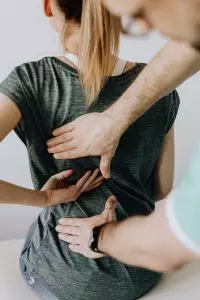
Severe lower back pain, blood in urine, burning pee? These could be signs of kidney stones. Acupuncture and TCM offer an alternative or adjunct kidney stones treatment that can help relieve kidney stone pain and dysuria, or painful urination.
Kidney stones are hard mineral deposits that form in the kidneys or other parts of the urinary tract. Salt and minerals can crystallize when urine reaches a certain level of concentration.
Often, kidney stones form when there are calcium oxalate crystals in urine. Calcium levels can be high because of eating too much sodium.
The ureters are the tubes that connect the kidneys to the bladder. If a kidney stone moves into a ureter and becomes lodged there, it can cause left lower back pain or right lower back pain. This is known as “passing a kidney stone.”
Kidney stones are very common, and many people go to the ER when they are experiencing severe lower back pain on one side and peeing blood. This happens when one or more kidney stones find their way into one of the ureters and become lodged there. This blocks the flow of urine and can cause severe pain and cramping.
Acupuncture can help reduce kidney stone pain in the short term, and help address the imbalances that are the root cause of kidney stones.
What Causes Kidney Stones?

Kidney stones form when there is not enough urine, and it becomes too concentrated. This often is due to not drinking enough fluids and getting dehydrated. Other kidney stone causes include:
- Not drinking enough water, dehydration
- Too much salt
- Too much sugar, fructose, or high fructose corn syrup
- Too much meat, too few fruits and vegetables
- Lack of exercise or too much exercise
- weight loss surgery, bariatric surgery, which can cause chronic diarrhea
- Infections, UTIs
- Gout
- Chronic diarrhea due to Crohn’s disease, ulcerative colitis
- Type 2 Diabetes, high blood sugar levels
Kidney stones are differentiated into different types, depending on their mineral composition. The types of kidney stones are:
- Calcium stones – deposits of calcium oxalate or calcium phosphate
- Uric acid stones – high levels of uric acid can be due to eating a lot of animal proteins
- Struvite stones – can form after a UTI
- Cystine stones – cystinuria is an inherited condition that causes buildup of the amino acid cystine in the urinary tract
Top 10 Symptoms of Kidney Stones
Many people have kidney stones and are not aware of them. It is possible to have kidney stones without pain or kidney stones without urinary symptoms. You may only find out about them when having imaging tests done for some other reason.
However, passing a kidney stone can certainly cause intense pain and other upsetting symptoms. The most common signs of kidney stones include:
- Sharp pain on one side of the lower back
- Cramps in one side
- Pain in the lower abdomen or groin
- Urgent need to pee, urinary urgency
- Peeing a lot, urinary frequency
- Burning sensation when peeing, dysuria
- Dark urine, blood in urine
- Nausea, vomiting
- Pain at the tip of the penis
- Fever and/or chills
Kidney stone pain can range from mild to severe, and it can come and go or be constant.
Acupuncture treatment has been shown to be effective for reducing kidney stone pain when used as an adjunct in emergency medical care settings when someone is waiting for conventional treatment.
Treatment for Kidney Stones
Kidney stones are diagnosed through blood tests and urine tests, which will show if there is too much uric acid, calcium, or other minerals that can cause stones to form. Imaging tests, such as ultrasound, may be able to detect where stones are stuck in the urinary tract.
If a person is passing stones (kidney stones in toilet), they may be analyzed to determine what sort of mineral has formed them.
In many cases, people will be encouraged to wait until the stones pass on their own. In this case, simply drinking adequate fluids and using pain medication to manage the intermittent pain and cramping will be recommended. Medications such as alpha blockers (Flomax) may be prescribed to help relax the ureters.
If the kidney stones are too large to be passed, then surgery may be indicated. Procedures using sound waves are sometimes used to help break up the stones. Surgery using small scopes and instruments can also remove the stones. A stent may be placed in the ureter to help keep it open until swelling goes down and it heals.
Studies have indicated that a combination of medications like Flomax and Chinese herbs may help to expel kidney stones. TCM treatment can help prevent the need for surgery.
Can Acupuncture and Herbs Help Kidney Stones?
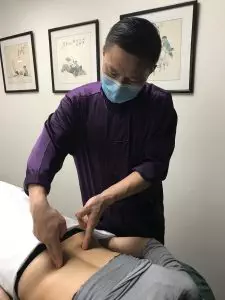
According to TCM theory, kidney stones are in the category of “Shilin” conditions, in which urination is difficult. Chinese herbs have traditionally been used to help balance the electrolyte minerals in the body, which helps prevent stones from forming in the urinary tract.
TCM treatment for kidney stones includes herbal medicine to help increase urine volume and excretion of minerals and inhibits the formation of calcium crystals.
Acupuncture treatment has an anesthetic effect which can help relieve the pain of kidney stones while other treatments take effect to help reduce and prevent the formation of new kidney stones.
One trial found that acupuncture treatment helped relieve kidney stone pain faster than pharmacological medications. Acupuncture treatment has no side effects, while 43% of the people in the study who were given intramuscular anesthesia report side effects like skin rash, irregular heartbeat, and drowsiness.
Acupuncture and acupressure can help relieve severe back pain and pelvic pain due to various urinary and other reproductive system conditions. It can also help reduce the anxiety and depression that people sometimes experience when faced with severe pain.
How to Prevent Kidney Stones
Drinking plenty of water is probably the most important thing you need to do to prevent dehydration and low volume of urine. In addition to staying hydrated, you should:
- Reduce sodium intake by eating less salt and fewer processed and packaged foods.
- Reduce foods that encourage calcium oxalate stones: meats, berries, beer, black pepper, spinach, chocolate/cocoa, and tea.
- Combine calcium-rich foods or drinks with foods that contain oxalate, so that they can be absorbed well together. This could mean eating spinach with cheese, or berries with yogurt. The citrate in citrus juices can also help discourage stone formation.
- Add foods with a high ratio of magnesium to calcium, such as: brown rice, oats, barley, bananas, soybeans, and flaxseeds.
- Be sure to replace lost fluids when you sweat through exercise or by being in a sauna, steam room, or hot tub, or just by being in the heat during the summertime.
- Balance your Ph levels. For some people this may mean increasing alkaline foods. As your acupuncturist about checking your Ph levels.
Acupuncture Near Me for Kidney Stones, Los Angeles
TCM treatment can help reduce pain and address the root causes of many conditions that cause urinary urgency and frequency, like BPH, UTIs, chronic kidney disease (CKD), and interstitial cystitis. Acupuncture can also help relieve pelvic pain and low back pain due to many other conditions, like endometriosis, and mittelschmerz. If you are experiencing urinary symptoms or recurring bladder pain or back pain, consider consulting an experienced acupuncture practitioner to resolve the root issue.
*This article is for education from the perspective of Traditional Chinese Medicine only. The education provided by this article is not approved by FDA to diagnose, prevent, treat and cure human diseases. It should not stop you from consulting with your physician for your medical conditions. Traditional Chinese Medicine is based on Qi, which is an invisible force that usually cannot be observed by modern science. Because science focuses on testing ideas about the natural world with evidence obtained through observation, these aspects of acupuncture can’t be studied by science. Therefore acupuncture and Chinese herbs are often not supported by double-blind, randomized trials, and they are considered alternative medicine therapies in the United States.
How to Treat Interstitial Cystitis With Acupuncture and TCM
By Xiaomei Cai, L.Ac. Ph.D. & Qineng Tan, L.Ac., Ph.D.
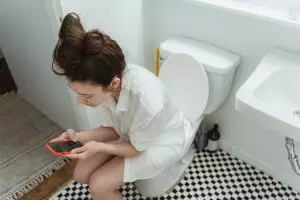
Bladder pain and pressure? Urinary urgency? Pelvic pain that feels like a UTI or bladder infection? Interstitial cystitis is a painful bladder syndrome caused by bladder inflammation. Acupuncture and TCM offer an alternative interstitial cystitis treatment that can help relieve interstitial cystitis symptoms.
Interstitial cystitis is a chronic pain condition that is difficult to diagnose and treat with conventional medicine. It is generally considered a urological or gynecological condition, but actually, men and women can both experience what is sometimes referred to as painful bladder syndrome (IC/PBS) or “frequency-urgency-dysuria syndrome.” Dysuria means “painful urination.”
While interstitial cystitis can be different from person to person, the best way to describe it is feeling like you have the urinary frequency that is characteristic of a UTI or symptoms bladder infection all the time—except that there is no bacterial infection present, so the condition does not get better with antibiotics.
Interstitial cystitis and overactive bladder (OAB) share many of the same signs and symptoms and can sometimes overlap. The primary difference between these two conditions is that interstitial cystitis usually involves pelvic pain in addition to urinary urgency, while overactive bladder involves urinary incontinence, but usually not significant bladder pain.
That feeling of bladder pressure and urinary urgency can really get in the way of your daily activities. People who suffer from interstitial cystitis may feel like they’re going to the bathroom every few minutes all day long. Even though they’re peeing a lot, though, the painful urgency to urinate again returns quickly.
Interstitial cystitis involves irritation and inflammation of the bladder that can ultimately cause a buildup of scar tissue in the bladder and may decrease its capacity to hold urine. There may also be small amounts of blood in the urine (hematuria) due to pinpoint bleeding on the bladder walls.
What Causes Interstitial Cystitis?
Medical science has not yet discovered why some people experience interstitial cystitis (IC). It has been suggested that it may be related to an autoimmune disease attacking the bladder or causing inflammatory cells to develop in the bladder, nerve signals that are causing painful sensations even though nothing is wrong, some type of allergic reaction to chemicals in the urine, or sores developing in the bladder lining.
Some people who suffer from interstitial cystitis may also have IBS, fibromyalgia, migraines, or other chronic pain conditions. There is some evidence that IC is associated with also having an autoimmune condition, such as lupus, rheumatoid arthritis, or a thyroid disorder.
Interstitial cystitis bladder pain is a complex problem with both physical and emotional components. The urgency to pee can become so persistent and painful that it gets in the way of normal life, and even relationships. Fortunately, TCM and acupuncture offer holistic treatment for interstitial cystitis that can help relieve pain and anxiety.
Top 5 Interstitial Cystitis Symptoms
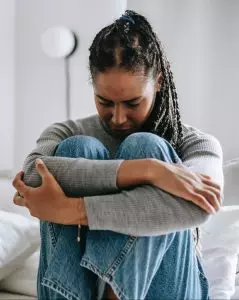
Each person’s experience of interstitial cystitis is unique. For some, the uncomfortable sensations of urinary frequency and bladder pressure may come and go. For others, bladder pain may be constant.
The common symptoms of interstitial cystitis include:
- Urinary frequency, peeing a lot
- Urinary urgency, feeling like you have to pee even when you just went
- Only peeing a small amount when you go
- Bladder pain, bladder pressure, pelvic pain, pain in the perineum
- Pain during sex
Menstruation can cause interstitial cystitis pain to worsen, as can certain foods or drinks, having sex, or sitting for long stretches of time.
Top 10 Triggers of Interstitial Cystitis Pain
People with interstitial cystitis are often advised to keep a record of their eating habits and pay attention to what foods or beverages seem to make their symptoms worse.
Things that may trigger bladder pain include:
- Tomatoes
- Citrus fruits
- Alcohol
- Caffeine – coffee, tea
- Carbonated beverages, soda, pop
- Fruit juice
- Chocolate
- Artificial sweeteners
- Milk and other dairy foods
- Spicy foods
Going on an elimination diet, in which you avoid certain foods for a period of time and see if your symptoms abate, may help.
Interstitial Cystitis Treatment
Medical treatment for interstitial cystitis is focused mainly on mitigating symptoms. Painkillers, antihistamines, and antidepressants are most commonly prescribed to help relieve painful bladder syndrome.
Amitriptyline is approved to treat depression, but is sometimes used to help treat autoimmune-related chronic pain due to fibromyalgia and MS, as well as interstitial cystitis.
Elmiron is a drug specifically approved to help protect the lining of the bladder from irritation. It can take several months for it to start working. It has some serious side effects, including potentially permanent damage to the retinas of the eyes.
Bladder instillations for interstitial cystitis are “cocktails” of medicines that are injected into the bladder with a catheter and held for 15-30 minutes. Treatments may be given weekly or a few times per week over the course of several weeks. Some people get relief from their symptoms with this method. Others may find the catheterization process uncomfortable or painful.
None of these treatments are a cure for interstitial cystitis. TCM and acupuncture offer an alternative treatment for painful bladder syndrome that can relieve pain and address the root cause of the problem.
Can Acupuncture Help Interstitial Cystitis?
According to TCM, the healthy function of the bladder relies heavily on the kidney and spleen, which provide yang energy to warm the bladder. When the Kidney Qi is deficient, the bladder may be too weak to hold urine.
Kidney Qi can be weakened by a long illness, or by repeated UTIs that have not been adequately addressed. It has been noted through medical imaging that prolonged illnesses can cause the bladder to contract in size. It can also become much more sensitive.

Painful urination can begin after someone has a difficult childbirth or other trauma to the pelvic organs. This can have consequences that affect someone both physically and emotionally.
Stagnation of Liver Qi can occur due to a strong emotional upset or depression. The Liver channel moves around and through the pelvis and external genital organs, so when Liver Qi is not moving freely, it can lead to pain or dysfunction in this area. Particularly if Liver Qi has too much heat, it can negatively impact the function of the bladder and pelvic floor area.
To determine what is causing interstitial cystitis pain, an acupuncturist will look carefully at other, seemingly unrelated symptoms that person is experiencing.
For example, if bladder pain is accompanied by fatigue, ear ringing (tinnitus), and cold hands and feet, those are all indicators that Kidney Yang is deficient and cold. Ears are considered to be the opening of the Kidney meridian.
If they are thirsty all the time, have a lot of allergies, warm hands, and tend to feel anxious, these are signs that Kidney Yang is too hot.
An acupuncture treatment protocol will then be developed accordingly to address both the pain and pressure on the bladder, as well as the underlying conditions that are causing imbalances in the organ systems.
Moxibustion treatment and electro-acupuncture may also be used to help relieve bladder pain symptoms.
One study in which patients diagnosed with interstitial cystitis were given one acupuncture treatment per week for four consecutive weeks found that urinary frequency was significantly decreased.
Another study showed that a majority of patients who received weekly acupuncture for three months showed significant improvement or complete relief from urinary symptoms.
Another study suggested that acupuncture treatment may help to relieve bladder irritation and urgency by helping to block nerve impulses around the urethra, the neck of the bladder, and the pelvic floor area.
Acupuncture Near Me for Interstitial Cystitis
Acupuncture is a particularly good modality for helping to treat complicated issues when conventional medicine is not working. Interstitial cystitis is still not well understood by modern science, but TCM methods work well to relieve both physical and emotional pain associated with painful bladder syndrome. If you are experiencing urinary frequency and bladder pressure, but know that you don’t have an infection, please consider giving acupuncture a try.
*This article is for education from the perspective of Traditional Chinese Medicine only. The education provided by this article is not approved by FDA to diagnose, prevent, treat and cure human diseases. It should not stop you from consulting with your physician for your medical conditions. Traditional Chinese Medicine is based on Qi, which is an invisible force that usually cannot be observed by modern science. Because science focuses on testing ideas about the natural world with evidence obtained through observation, these aspects of acupuncture can’t be studied by science. Therefore acupuncture and Chinese herbs are often not supported by double-blind, randomized trials, and they are considered alternative medicine therapies in the United States.
How to Treat Hay Fever With Acupuncture and TCM
By Qineng Tan, L.Ac. Ph.D. & Xiaomei Cai, L.Ac., Ph.D.

Itchy eyes, runny nose and sneezing? These are some of the classic seasonal allergy symptoms, also known as allergic rhinitis, or hay fever. Acupuncture and TCM herbs can help relieve allergies, including pollen allergy symptoms.
Seasonal allergies affect about 20% of Americans. Allergic rhinitis is an immune system reaction to an allergen in the air that can be inhaled, like pollen from budding trees, growing grass, and plants like ragweed. Hay fever is a common term that typically describes being allergic to pollen.
“Pollen” are tiny seeds from plants that can be carried by the wind. When there is lots of pollen in the air, this is called a high pollen count. You can check the pollen count, like a weather report, to see when it is particularly high, and thus may affect people who suffer from seasonal allergies and asthma.
While having an allergic reaction to common airborne allergens happens most often during the spring, summer, and early fall, when plants are giving off a lot of pollen, people can actually experience hay fever at any time of the year.
Similar allergy symptoms can occur due to exposure to dust mites, molds, and pet dander.
Acupuncture and TCM can help relieve the irritating symptoms caused by allergic reactions by helping to strengthen and balance the immune system so that it is not so easily triggered.
Top 10 Seasonal Allergy Symptoms
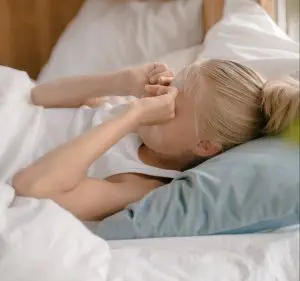
The body’s histamine response causes inflammation of the mucus membranes in the sinuses and throat. The increased mucus production occurs in order to drive out the offending allergens.
Pollen allergy symptoms are similar to those of the common cold. Signs of hay fever include:
- Sneezing
- Nasal congestion
- Runny nose, itchy nose
- Itchy eyes, watery eyes (allergic conjunctivitis)
- Itchy throat
- Postnasal drip
- Headaches, sinus pain
- Dark circles under eyes, puffy eyes, “allergic shiners”
- Fatigue, malaise, generally feeling under the weather
- Wheezing, coughing, trouble breathing
Skin rash is a less common symptom of seasonal allergies, but some people do develop a hay fever rash. The itchy allergy rash may look similar to hives: raised red welts on the skin.
Treatment for Hay Fever
The common medical treatment for hay fever is an antihistamine. Histamines are chemicals that occur naturally in the body as part of the immune response to allergens in the environment. The release of histamines is what leads to allergy symptoms like a runny nose and itchy eyes.
Antihistamines come in pill or spray form, and they block the histamine response, which can temporarily relieve the hay fever symptoms. However, these medications do have side effects, the most common of which is drowsiness.
If someone is not getting relief from antihistamines, then corticosteroids, or steroids, may be prescribed. These work as anti-inflammatories, which in this case means that they reduce the swelling of mucous membranes. Steroids, too, can have significant side effects, especially when used over a long period of time.
Nasal sprays for allergies, like Flonase or Mucinex, are decongestants that are designed to be sprayed into the nose to help reduce allergy runny nose. Again, these may provide some temporary relief, but people can quickly get used to them, so they stop being effective.
Acupuncture and TCM offer an alternative treatment for allergies that can help relieve hay fever symptoms without side effects.
Can Acupuncture Help Hay Fever?
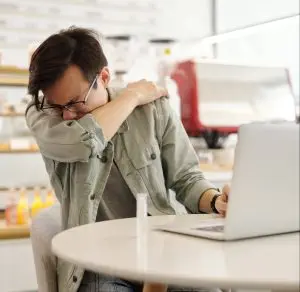
According to TCM theory, allergies fall under the category of illnesses that are caused by “wind” as a pathogenic force that can invade the body. In the TCM view, hay fever occurs due to wind-heat getting into the lungs.
Weakness of the kidneys and spleen can also contribute to hay fever; when they are sluggish, mucus tends to build up, and we become more easily fatigued.
When the defensive Qi is strong, it can protect us from cold, heat, wind, and dampness getting into the body and causing problems. Defensive Qi is roughly analogous to what we think of as the immune system in conventional medicine.
TCM treatment for allergic rhinitis may include acupuncture, herbal supplements, moxibustion, and nutrition counseling. TCM can be used either as an alternative therapy for allergies, or as an adjunct treatment for hay fever, along with pharmacological treatment.
Chinese herbs have been used for many centuries to treat allergy symptoms. Now, we are able to see scientific evidence that these herbs, such as astragalus, magnolia flower, and licorice root, do actually have an effect on the immune response and histamine function by helping to regulate the production of chemicals like cytotoxic T-cells and immunoglobulin G. Compounds found in scutellaria root have been found to inhibit the production of inflammatory cytokines, and stephania root can help prevent anaphylaxis.
With Chinese herbal medicine, we are able to create customized formulas for each patient, depending on their particular presentation of symptoms.
Acupuncture is a highly effective modality for all types of allergies, from allergic rhinitis to atopic dermatitis or eczema, and can help relieve the nasal sinus symptoms that affect the eyes, nose and mouth if someone is allergic to pollen. It can also help reduce itching due to allergic skin rashes.
A clinical trial conducted at a hospital in China showed that a regimen of acupuncture and herbs resulted in over 90% of patients reporting that their nasal symptoms were greatly reduced.
Another published study showed that acupuncture reduced levels of Immunoglobulin-E, an antibody that is associated with allergy responses.
A review of studies of acupuncture for allergic rhinitis showed that this treatment has both short-term and long-term efficacy.
TCM treatment for seasonal allergies allows us to get to the root cause of allergy symptoms and help prevent them from happening. In this way, acupuncture and herbs can function as preventive medicine for hay fever. Getting acupuncture periodically throughout the year can help you avoid allergy attacks when the pollen count is high.
Top 3 Tips for Hay Fever Prevention
Here are some things you can do to help prevent spring hay fever and relieve pollen allergy symptoms:
- Avoid dairy food and cold foods, which promote more mucus production.
- Apply warm compresses to the face to soothe the eyes and nasal area.
- Use an air purifier in your home to keep allergens out of the environment.
To relieve allergies, emphasize more cooked foods that help warm the body.
Acupuncture Near Me for Hay Fever in Los Angeles Area, Santa Monica
The multifaceted approach of TCM makes it uniquely suited to help relieve seasonal allergy symptoms. Acupuncture can help reduce hay fever symptoms right away and help prevent allergies from knocking you down every time the pollen count is high. Please do not hesitate to seek relief from hay fever by giving acupuncture and herbs a try.
*This article is for education from the perspective of Traditional Chinese Medicine only. The education provided by this article is not approved by FDA to diagnose, prevent, treat and cure human diseases. It should not stop you from consulting with your physician for your medical conditions. Traditional Chinese Medicine is based on Qi, which is an invisible force that usually cannot be observed by modern science. Because science focuses on testing ideas about the natural world with evidence obtained through observation, these aspects of acupuncture can’t be studied by science. Therefore acupuncture and Chinese herbs are often not supported by double-blind, randomized trials, and they are considered alternative medicine therapies in the United States.
How to Treat Ovulation Pain With Acupuncture and TCM
By Xiaomei Cai, L.Ac., Ph.D. and Qineng Tan, L.Ac., Ph.D.
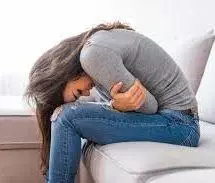
Cramping during ovulation, ovary pain, ovulation pain on one side? Ovulation cramps are very common. Acupuncture and TCM can help ease severe ovulation pain and help with all kinds of ovulation disorders.
The medical term for ovulation pain is “Mittelschmerz,” which means “middle pain” in German. The term Mittelschmerz syndrome refers to the fact that ovulation cramps occur in the middle of the menstrual cycle, typically about 14 days before the next menstrual period.
Studies have suggested that 35-50% of people who ovulate experience cramping during ovulation. Other ovulation symptoms include:
- Ovulation pain on one side
- Pelvic pain, abdominal pain
- Dull ache or sharp twinge of pain in pelvis
- Vaginal pain during ovulation, vaginal cramps
- Cervical cramps, cervix cramps, cervical pain
- Pain around or near the tailbone, tailbone pain
- Back pain, hip pain, or rib pain
- Bloating, bloated stomach
- Fatigue
- Breast tenderness
- Mood swings
- Spotting
- Nausea
- Diarrhea
- Lack of appetite
The process of ovulation involves luteinizing hormone (LH) stimulating follicles on the ovary to mature then break free from the ovary and move through the fallopian tube.
Follicles are like small cysts which stretch the surface of the ovary and then rupture. Blood and other fluids may be released, and this may be part of what causes pelvic pain during ovulation.
Estrogen levels are usually at their highest at the time of ovulation, which can contribute to water retention and uncomfortable bloating in the pelvic area.
For people who are trying to get pregnant, ovulation pain and fertility—or ovulation pain and pregnancy success—may seem related, because the cramping lets them know when they are most fertile.
Many people never notice any signs of ovulation if they aren’t specifically watching for them. For some, ovary pain during ovulation is a sharp cramp that only lasts a few minutes, or a few hours. For others, ovulation pain and pelvic cramps can be so severe that they are debilitating.
Acupuncture and TCM treatment can help relieve ovulation cramps and help regulate hormones to alleviate other ovulation symptoms and problems, as well.
What Causes Ovulation Pain?
Why do some people experience more severe ovulation pain than others? Medical science has not determined exactly why some people experience pain during ovulation and others don’t.
Sometimes ovulation pain can be so bad that people go to the emergency room. In this case, doctors will want to rule out other possibilities. Many conditions can cause pelvic pain, including:
- Appendicitis
- Constipation
- UTI
- IBS
- Celiac disease
- Interstitial cystitis
- Kidney stones
- Gallbladder attack
- Ulcer
- STIs
- Bowel obstruction
- Hernia

Pelvic pain that is related to the reproductive organs can include:
- Menstrual cramps, PMS, dysmenorrhea, painful periods
- Ovarian cyst, ruptured ovarian cyst, twisted ovarian cyst
- Endometriosis
- Uterine fibroids, leiomyoma of the uterus
- Pregnancy
- Ectopic pregnancy
- Pelvic inflammatory disease
- Scar tissue in the pelvic area
- Cancers of the reproductive organs
These conditions not only cause pain, but may interfere with fertility if and when you are ready to conceive.
Endometriosis Ovulation Pain or Ovarian Cyst Pain?
Ovary pain may be related to other issues, apart from ovulation.
Some women begin to experience more ovulation pain when they are going through perimenopause, due to changing estrogen levels.
Ovarian cysts—sacs filled with fluid that develop on the ovaries—are very common. These usually form during ovulation and then go away on their own. However, in some instances, they grow larger, and can cause considerable pain.
Signs of ovarian cyst may be a constant ache, or one that comes and goes, or sudden, sharp pains that happen occasionally. Other ovarian cyst symptoms include: bloating, swelling, and pressure in the pelvic area. If the cyst ruptures, there may be a very sudden, severe pain on one side, and if the cyst becomes twisted or torqued, there may be severe pain accompanied by nausea or vomiting.
Polycystic ovarian syndrome (PCOS) is a hormonal condition in which a person does not ovulate regularly. In many cases, lots of small cysts form on the ovaries, which can cause bloating and pelvic pain.
Ovulation pain can be differentiated from PCOS or ovarian cyst pain mainly by the fact that it occurs only during a specific window of time during the ovulation cycle. If you are using a fertility calculator (ovulation calculator) to track your cycle, then you may be more aware of how your ovulation cycle works and when your fertile window is going to occur.
Endometriosis is a condition in which uterine lining tissues develop in other areas of the body, particularly on the ovaries and fallopian tubes. One of the primary symptoms of endometriosis is pelvic pain, which can be severe and happen at any time during the menstrual cycle. Some people report increased pain during ovulation, as well as severe menstrual pain.
Endometriomas (also known as “chocolate cysts”) can develop in and around the ovaries. There can also be scar tissues, or adhesions, around the ovaries. These tissues may contribute to the increased pain ovulation can cause when you have endometriosis. In these cases, the pain may radiate to other areas, even down to the thighs. Having sex may also be painful around the time of ovulation.
It is important to consult with a health professional if you are experiencing ovary pain, vaginal pain or severe menstrual pain.
PCOS and endometriosis not only cause pain and other uncomfortable symptoms, but can lead to infertility.
If your periods are irregular, or you have reason to suspect that you are not ovulating, it is important to seek health care. Severe pain or missed periods may be sending a signal that there is a deeper issue that needs to be addressed.
Treatment for Ovulation Pain
Ovulation pain may not occur every month. Some people may get relief from occasional ovulation pain by taking over the counter pain relievers like ibuprofen.
If ovary pain is happening frequently and is unbearable, a doctor may recommend hormonal birth control, like oral contraceptives or the Nuvaring. These birth control methods suppress ovulation, and therefore prevent mittelschmerz. However, hormonal birth control can have other negative side effects, and is not suitable for those who may be trying to get pregnant.
Can Acupuncture Help Ovulation Pain?

In TCM, we see ovulation as being a transition from Yin dominant energy to Yang dominant energy. The Yin energy has built up to the point when the egg is released, then Yang energy warms the uterus to prepare it for potential conception.
If there is stagnant Qi (life force energy) in the organ systems, this can cause the intense cramps some people experience during ovulation.
Acupuncture treatment, herbs, and the right nutrition can help move Qi and blood. The smooth flow of Liver Qi, in particular, is essential to not only enhance fertility, but to help ovulation and menstruation occur without blockages that cause pain.
Acupuncture and Chinese herbs have been shown to help relieve all types of gynecologically related pelvic pain, including endometriosis pain, menstrual pain, and period back pain.
Acupuncture treatment has a natural effect on the key hormones involved in follicle development, ovulation, and menstruation: estrogen, progesterone and prostaglandins. Balancing these hormones can help to regulate ovulation when it is not occurring, and also to help relieve cramps, tension, and other symptoms.
Top 3 Acupressure Points for Ovulation Pain
Here are some acupoints for ovulation cramps that you can use to help relieve pelvic pain.
- “Sea of Qi” CV6 – 1-2 inches below belly button, massage in a circular motion for at least a minute
- San Jiao Jiu CA6- 2 points that make a triangle with the navel, press firmly
- Zigong Ren Channel 3 – 4-5 inches below the belly button, press firmly for a minute
Acupuncture Near Me for Ovulation Pain
Whether you are experiencing monthly ovulation cramping, not sure when or if you are ovulating, or suspect that you may have PCOS, endometriosis, or fibroids, TCM and acupuncture offer a highly effective alternative treatment for gynecological issues. The doctors at Art of Wellness are highly respected experts when it comes to fertility treatment and women’s health. Their unique knowledge of Western gynecology and obstetrics combined with TCM allows them to work with you and your individual situation.
*This article is for education from the perspective of Traditional Chinese Medicine only. The education provided by this article is not approved by FDA to diagnose, prevent, treat and cure human diseases. It should not stop you from consulting with your physician for your medical conditions. Traditional Chinese Medicine is based on Qi, which is an invisible force that usually cannot be observed by modern science. Because science focuses on testing ideas about the natural world with evidence obtained through observation, these aspects of acupuncture can’t be studied by science. Therefore acupuncture and Chinese herbs are often not supported by double-blind, randomized trials, and they are considered alternative medicine therapies in the United States.
How to Treat Eczema With Acupuncture and TCM
By Qineng Tan, L.Ac., Ph.D. and Xiaomei Cai, L.Ac., Ph.D.

Itchy skin, dry skin? A bumpy skin rash that is raw from scratching it? Eczema, sometimes known as atopic eczema or atopic dermatitis, is a very common inflammatory skin condition. Acupuncture and TCM can help relieve itchy, scaly skin caused by eczema and skin allergy.
Eczema is a chronic inflammatory condition that flares up when triggered and becomes an allergic reaction rash. An eczema rash can look red and bumpy, or feel warm or hot to the touch. It can also show up as dry patches of skin that are rough and leathery, and can be brown or gray in color.
Scaly skin or eczema skin rashes that itch can appear anywhere on the body, but most commonly occur on the face, back of the neck, elbows, forearms, or backs of the knees.
Clusters of small, itchy fluid-filled blisters on the hands, fingers, or soles of the feet are known as dyshidrotic eczema, or dyshidrosis. This type of eczema can happen once, as an isolated incident, or become a chronic problem that keeps coming back.
What Causes Eczema?
Eczema is a widespread condition that often shows up in early childhood. About 80% of people who have atopic dermatitis show signs of skin rashes by the time they are six years old. It is estimated that about 1 in 10 people have some form of eczema.
The exact cause of eczema is not known, but it is generally believed to be a combination of factors, including: genetics, overactive immune function, and irritants in the environment.
Eczema is not contagious, but a person is more likely to experience allergic skin rash if allergies tend to run in their family. People who have hay fever, asthma, or are allergic to pet dander, pollen, or dust mites are more likely to have skin allergies like eczema, too, and possibly to pass these conditions on to their children.
Top 20 Eczema Triggers
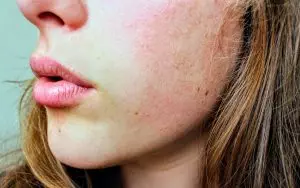
Eczema rashes tend to flare up when triggered by exposure to some allergen or element in the environment, or even a stressful situation. Common triggers for eczema breakouts include:
- Pet hair or dander
- Pollen
- Mold
- Dust or dust mites
- Insect bites
- Wool
- Synthetic fabrics like polyester or latex
- Metals, like copper, nickel, or gold
- Cigarette smoke
- Detergents or soaps
- Cleaning products
- Dyes
- Perfumes
- Chemicals in cosmetics or skin care products
- Frequent hand-washing
- Too-hot or too-frequent showers or baths
- Sweating
- Cold, dry places
- Humidity
- Emotional stress, work stress, or pressure at school
6 Types of Eczema
Eczema can present itself in different forms, with different types of skin conditions. The most common kinds of eczema include:
-
Atopic eczema or atopic dermatitis – dry, red, itchy, and/or bumpy skin
-
Contact eczema – caused by touching some irritant
-
Dyshidrotic eczema – marked by small, itchy blisters
-
Hand eczema– dry, peeling skin on the hands due to exposure to irritants or wetness
-
Neurodermatitis – thick, leathery, itchy patches of skin
-
Nummular eczema or discoid eczema – round lesions on the limbs or torso
The itchiness caused by eczema rashes is called pruritus, and it can be very intense, even disturbing a person’s sleep. Scratching the affected skin can damage it further, though, and lead to infections, so it is very important to find an effective treatment for the itching.
Eczema Cream and Eczema Treatment

Topical eczema cream is the most common treatment for atopic eczema. Topical corticosteroids are immunosuppressants in a cream form that help reduce inflammation and heal the itchy rash of an eczema flare up. However, when these topical steroid creams are used for long periods of time, they can make the skin thinner and more susceptible to bruising. Blood vessels may become more prominent (spider veins). Steroids inhibit the natural immune function of the skin, so a person may be more prone to skin infections.
Oral immunosuppressants like cyclosporine or systemic steroids may also be prescribed to treat eczema, but these, too, can only be used safely on a temporary basis, to help reduce the itchiness of a flare-up. Taking these medications for an extended period of time can have serious side effects, and they do not really address the root cause of eczema.
Acupuncture and TCM can be used as an alternative or adjunct eczema treatment, which can not only help relieve itching and help heal sores, but can help prevent flare-ups from returning.
Can Acupuncture Help Eczema?
The TCM theory of the Five Elements informs the way that we diagnose and treat each individual case of eczema. The root causes of eczema, or any skin rash, lie beneath the surface of the skin.
In TCM, Heat, Wind, Dryness, and Dampness are considered pathogenic forces that can take hold in the internal organs and then affect the way that skin cells develop. Examples of TCM diagnostic patterns of eczema or atopic dermatitis include:
- Brimming heat of heart and spleen
- Heart and spleen deficiency
- Spleen deficiency and dampness retention
- Wind and dryness due to blood deficiency
Each person’s experience with eczema is different because of the particular environmental or emotional triggers involved in the outbreak. By closely observing the color, temperature, and overall nature of the skin rash or scaly, thickened skin, the acupuncturist will get clues as to which internal systems are affected. By asking detailed questions about the patient’s lifestyle, the TCM practitioner is able to make recommendations that will help prevent further flare-ups.
Acupuncture treatment for eczema has been shown to help relieve itching better than antihistamines, and can also help to reduce skin inflammation.
Chinese herbal supplements designed to help relieve itchy skin have been shown to help relieve pruritus and reduce swelling. These studies suggest that herbs may be just as effective as topical steroids, but without the negative side effects.
The integration of Western medical methods and TCM treatment for eczema can be more beneficial than pharmacological treatment alone. Short-term use of topical corticosteroid eczema cream to help reduce inflammation and itching can be paired with acupuncture and herbs to help prevent flare-ups from recurring.
Acupuncture for Eczema Near Me in West Los Angeles
We want you to feel comfortable in your skin. At Art of Wellness, our comprehensive training in Western medicine, TCM, herbal medicine, and nutrition allows us to create a highly personalized treatment protocol for each patient. Many of our patients can attest that getting acupuncture and taking herbs have helped them reveal clearer, brighter skin and find relief from the pain of rashes and blemishes. If you or someone you love is suffering with itchy skin or allergic reactions, please consider trying TCM treatment for eczema and skin allergy.
*This article is for education from the perspective of Traditional Chinese Medicine only. The education provided by this article is not approved by FDA to diagnose, prevent, treat and cure human diseases. It should not stop you from consulting with your physician for your medical conditions. Traditional Chinese Medicine is based on Qi, which is an invisible force that usually cannot be observed by modern science. Because science focuses on testing ideas about the natural world with evidence obtained through observation, these aspects of acupuncture can’t be studied by science. Therefore acupuncture and Chinese herbs are often not supported by double-blind, randomized trials, and they are considered alternative medicine therapies in the United States.